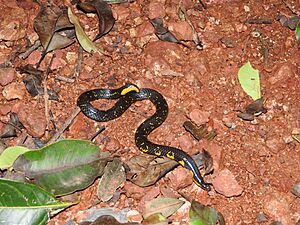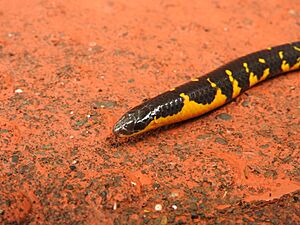Bombay earth snake facts for kids
Quick facts for kids Bombay earth snake |
|
|---|---|
 |
|
| Conservation status | |
| Scientific classification | |
| Genus: |
Uropeltis
|
| Species: |
macrolepis
|
| Synonyms | |
|
|
Uropeltis macrolepis, often called the Bombay earth snake or Bombay shieldtail, is a special kind of snake. It belongs to the Uropeltidae family. This snake is found only in southern India. There are two main types, or subspecies, of this snake.
Contents
Where It Lives
The Bombay earth snake lives in Maharashtra, India. You can find it in places like Phansad, Mahabaleshwar, Koyna, and Lonavla.
Its Home
This snake prefers to live in forests. It can be found at different heights, from about 10 meters (33 feet) to 1,350 meters (4,430 feet) above sea level.
What It Looks Like
The Bombay earth snake is usually black or dark purplish-brown. Each of its scales has a lighter edge. It has a yellow stripe on its lips and the sides of its neck. After this stripe, there are two to five large yellow spots. There is also a yellow stripe along each side of its tail.
Adult snakes can grow to be about 29.5 centimeters (11.6 inches) long, including their tail.
Its body scales are smooth and arranged in 15 rows around the middle of its body. The scales on its belly (ventrals) number between 128 and 140. The scales under its tail (subcaudals) are 7 to 9.
The snake's snout is rounded. The scale at the tip of its snout (rostral) is small. The scales on its nose (nasals) touch each other behind the rostral scale. The scale on its forehead (frontal) is about as long as it is wide. Its eye is more than half the size of the scale covering it. The snake's body is quite thin; its width fits into its total length 24 to 29 times. The scales on its belly are twice as big as the scales next to them. The end of its tail is shaped like a flat, slanted surface with strong, ridged scales. The very last scale on its tail has a ridge across it and two points.
How It Behaves
The Bombay earth snake lives on land (terrestrial). It also spends a lot of time digging and living underground (fossorial).
What It Eats
This snake mainly eats earthworms.
How It Reproduces
The Bombay earth snake gives birth to live young. This means the eggs hatch inside the mother's body, and then the babies are born alive. This is called ovoviviparous.
Types of Bombay Earth Snake
There are two recognized types, or subspecies, of the Bombay earth snake:
- Uropeltis macrolepis macrolepis (named by W. Peters in 1862)
- Uropeltis macrolepis mahableshwarensis (named by Chari in 1955)



